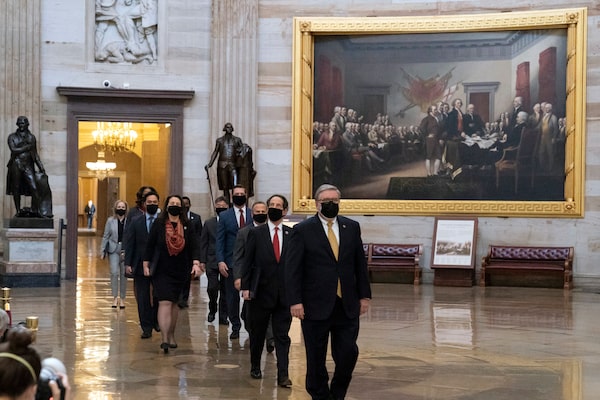
Acting Sergeant at Arms Timothy Blodgett, right, leads Rep. Jamie Raskin, second from right, the lead Democratic House impeachment manager, and other impeachment managers, through the Rotunda to the Senate for the second impeachment trial of Donald Trump in Washington on Feb. 9, 2021.Alex Brandon/The Associated Press
Donald Trump’s historic second impeachment trial opened with a video of the then-U.S. president whipping up a crowd at a rally, followed by images of his supporters beating up police officers, smashing windows and ransacking the Senate chamber in their deadly Jan. 6 attack on the Capitol building.
Senators voted 56 to 44 Tuesday to proceed with the trial for incitement of insurrection, rejecting an effort by Mr. Trump’s lawyers to argue that a former president cannot be subject to impeachment. Six Republicans joined all Democrats in the vote.
Democratic Congressman Jamie Raskin, serving as lead prosecutor in the case, showed the Senate 13 minutes of graphic footage. It interspersed clips of Mr. Trump urging supporters to descend on the Capitol that day to stop the certification of Joe Biden’s presidential victory with scenes of the subsequent riot. One scene, inside the same room that is now the setting for the trial, showed insurrectionists raiding senators’ desks and calling them “scumbags.”
Democrats take a ‘show, don’t tell’ approach in Trump’s impeachment trial
Mr. Raskin argued that Mr. Trump must be convicted to ensure no future leader ever again tries to overturn an election result. He warned that not trying him after leaving office would create a “January exception” that would allow a departing president to flagrantly break the law with no worry of impeachment.
“We cannot have presidents inciting and mobilizing mob violence against our government and our institutions because they refuse to accept the will of the people,” he said. “Much less can we create a new January exception in our precious constitution ... so that corrupt presidents have several weeks to get away with whatever they want.”
Even though the Senate cannot remove Mr. Trump from office, it could ban him from running for president again if he were to be convicted. The Democrats suggested that they may also try to use a separate process, the 14th amendment, to bar Mr. Trump from holding any federal office, should impeachment fail.
Mr. Trump’s chief lawyer, Bruce Castor, contended that the Democrats had already achieved their aim of defeating Mr. Trump in an election, rendering impeachment unnecessary. This line of argument, however, required Mr. Castor to admit that Mr. Biden won the election, something Mr. Trump still refuses to do.
“President Trump is no longer in office. The object of the Constitution has been achieved. He was removed by the voters,” Mr. Castor said.
Most of Mr. Castor’s speech did not directly address impeachment. Instead, he delivered a meandering, 47-minute address about the importance of the Senate. At one point, he reminisced about listening to recordings of the late senator Everett Dirksen during Mr. Castor’s Pennsylvania boyhood. At others, he compared the U.S. to ancient Greece and opined on Bible passages.
Another Trump lawyer, David Schoen, argued that Democrats were engaging in too much impeachment, which would lead to the procedure being used spuriously to “cancel” political rivals. Mr. Trump was previously impeached in late 2019 and acquitted by the Senate last year, for putting pressure on the Ukrainian government to investigate Mr. Biden.
The trial is a difficult balancing act for both parties.
While the Democrats do not want to let Mr. Trump’s actions pass without sanction, they are also worried that the trial will take up time they could otherwise spend speeding through their agenda. Mr. Biden expressed ambivalence about the proceedings Tuesday, telling reporters at the White House that he did not plan to watch them. “Children are going to bed hungry. A lot of families are food insecure. They are in trouble. That’s my job,” he said.
The Republicans, meanwhile, are torn between a minority who have condemned Mr. Trump’s behaviour and a majority who have remained loyal to the former president. The six who voted in favour of proceeding to trial were Mitt Romney, Lisa Murkowski, Ben Sasse, Pat Toomey, Susan Collins and Bill Cassidy. This tally confirmed how unlikely a conviction of Mr. Trump would be: It would take two-thirds of senators, or 67 votes, to convict the former president.
Both parties agreed to rules that provide for a relatively swift trial, which could be finished this week.
Previous presidential senate trials included the presenting of extensive evidence. In this case, senators themselves were witnesses to Mr. Trump’s alleged crime.
Mr. Raskin acknowledged these unusual circumstances in his speech, describing his personal experience on the day of the riot. He had buried his 25-year-old son, who died by suicide, the previous day, and had brought his daughter and son-in-law to work on Jan. 6 for moral support. Mr. Raskin described how his family members hid in fear of being killed by the mob, as he and other senators listened to rioters break down doors to the chamber.
“It is the most haunting sound I ever heard,” he said, appearing on the verge of tears. “I will never forget it.”
Our Morning Update and Evening Update newsletters are written by Globe editors, giving you a concise summary of the day’s most important headlines. Sign up today.
 Adrian Morrow
Adrian Morrow